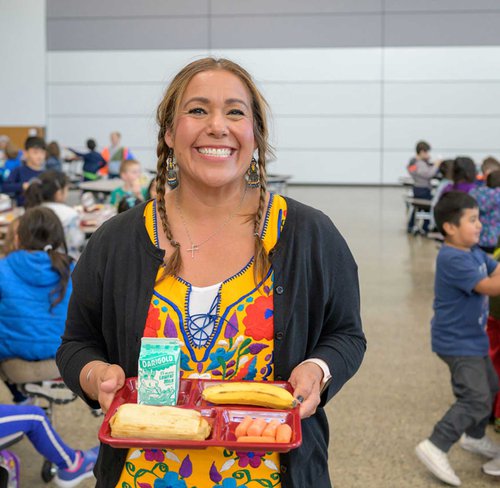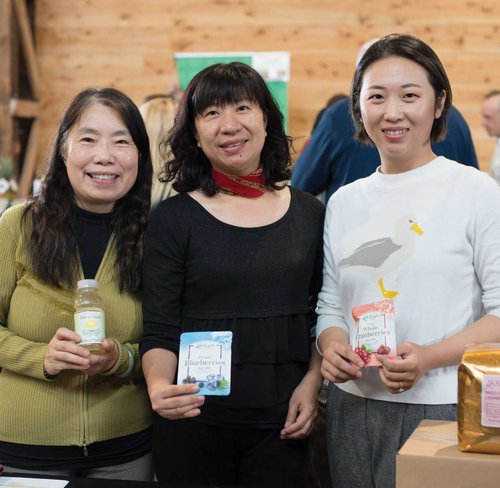
First brought online in 2019, the Oregon Harvest for Schools Directory is provided in partnership by the Oregon Department of Education, the Oregon Department of Agriculture, the Oregon Farm to School and School Garden Network, and Ecotrust.
In the Directory, foodservice staff can search for products from a vetted list of Oregon food producers primed to serve schools. With facilitated connections, schools are more likely to fill their menus with dietary variety, seasonal flavor, and culturally-specific cuisines. Our aim is for Oregon school food to reflect the cultural and racial diversity of Oregon students, act as a catalyst for community health, and be a critical hub for re-imaging the food system.
Since launching the site in 2019, we have welcomed more than 1,000 Oregon school food professionals to explore 45 product categories, and connect with 76 producers throughout the state.
Photo captions and credits:
Top: A student at Richmond Elementary enjoying Umi Organic school-lunch ready noodles. Shawn Linehan
Middle: When Portland Public Schools sought a tamale vendor, Lucy De León jumped on the opportunity to develop tamales that could be served in school cafeterias. Students from William Walker Elementary School in Beaverton are enjoying tamales made by Lucy and her team. Shawn Linehan
Bottom: Amanda Foster, Karen Lin, and Lia Fu of Fresh Elements Farms. This Salem-based business supplies dried fruits in single-serving snack packs to more than 15 Oregon school districts. Kim Nguyen

How does it work?
Here are the basics for getting started: Starting on the homepage, food buyers can click on images to search by product type (e.g. blueberries, beef, prepared foods, etc.) or use the filters to search by county or producer attributes. The Directory uses the selected search method to generate a list of vendors along with basic information such as product availability, location, liability insurance, certifications, and delivery options. Buyers can continue narrowing their search or reach out directly to listed producers using the contact information provided. Note: While the Oregon Harvest for Schools Directory facilitates connections, it doesn’t currently support direct purchasing or direct messaging.
How are producers added to the Directory?
The list of producers currently in the Directory was generated by a state-wide network of partners who have connections with both schools and producers and work to facilitate these relationships. Each vendor listed in the Directory has previously worked with schools or other institutions, or has been determined to be “school food ready.” Do you work with a producer who is not listed? Or, are you a producer who is ready to sell to schools and want to get listed? Get in touch with us to start the conversation!

We want to hear from you!
The Oregon Harvest for Schools Directory team is passionate about making the user experience behind this tool easy, efficient, and effective! We love farm to school and love to hear connection stories. If you have made a connection, or have suggestions for making it easier to do so, we want to hear from you!
FAQs and Site Guidance
Peruse the information below to learn more about terms you’ll see throughout the site, how to get support for your Farm to School programming, and answers to frequently asked questions.
Who are Farms in “farm to school”?
Also described as “Producers”, these are the farmers, growers, ranchers, fishers, tribal food providers, and prepared food businesses, and in some cases food hubs or distributors, who supply Oregon products.
What qualifies as a School in “farm to school”?
K-12 school districts, charter schools, early care and education settings, summer food service programs, and other institutions that serve children through meal programs. While not built specifically for other institutions such as colleges and hospitals, this tool can certainly be used by any institutional food buyer looking to connect with local producers and products.
How do I get support for my Farm to School programming?
In Oregon, we’re lucky to have a state-wide Oregon Farm to School Grant Program that provides funds for a wide array of farm to school and school garden programming, including procurement. The intent of the Farm to School Non-Competitive Procurement Grant has always been to support grantee purchasing of Oregon grown and processed food that might otherwise be cost prohibitive. Through the Competitive Procurement Grant, eligible Farm to School grantees are provided with additional funding above their original Farm to School award amount. Preference points are given for purchasing plans that include categories such as: purchasing from Black, Indigenous, or Person of Color (BIPOC)- or women-owned companies; serving culturally relevant foods; purchasing a variety of Oregon products; or purchasing new Oregon products and developing new commercial relationships. Tip: Use the “Producer Identity” filter to find and build relationships with producers who self-identify as a BIPOC-, women-, veteran-, tribally or Native American-owned business.
New product categories!
Prepared foods: These are items made in Oregon and may credit to one or more of the USDA Meal Components. Examples include: tamales, yakisoba noodles, etc.
Condiments, sauces, herbs, spices, other: These are items grown or processed in Oregon that may not credit to the USDA Meal Components but are nonetheless used by schools. Examples include: hot sauce, simmer sauce, flavor bases, etc.
Filter Descriptions
There are a lot of ways to find connections on the Oregon Harvest for Schools Portal. Below, find brief descriptions of all the ways you can filter the list of producers to find who you’re looking for.
Producer Identity: Select one or more of the options to find producers who have included one of the following self-identity attributes in their profile: BIPOC-owned, tribally or Native American-owned, women-owned, veteran-owned, family-owned. We recognize that identity is complex and not every systemically marginalized producer will feel represented by one or more of these categories. Please see individual producer profiles where more information may be available under “Additional Notes”. See above How do I get support for my Farm to School programming? for more information on Oregon’s Farm to School Grant Program. This filter supports the Competitive Procurement Grant, specifically where preference points are given for procurement plans that include purchasing from BIPOC- or women-owned companies; serving culturally relevant foods; purchasing a variety of Oregon products; or purchasing new Oregon products and developing new commercial relationships.
Meal Components: For more information on meal crediting in USDA Child Nutrition Programs, please visit the USDA Food Buying Guide for Child Nutrition Programs Interactive Web-Based Tool. The USDA meal components are meat/meat alternates, fruits, milk, vegetables, grains, other foods. Not every food meets the requirements to be credited by the USDA. It is up to food service staff to determine how to properly credit any items listed in this Directory for your meal programs.
County: Searching by county will tell you which products are available in your area.
Location: Searching by location will tell you which products are produced in your area. Sometimes products are produced in a specific region but available via distribution throughout the whole state. Some programs define “local” by their city, county, region, or by the whole state of Oregon.
Product details: Use this filter to show producers who have the product you want in the form you need it in such as frozen, dried, grab & go (products available in individual portion sizes), etc.
Delivery: Narrow your search by producers who have delivery methods that match your needs. We encourage you to reach out to producers who have products you are interested in but may not have a delivery method listed that works for you. Farm to school is built on relationships and producers may be able to work with you on creative solutions.
Product type: You can search by specific type of product, for example cucumbers, pork, beans, or strawberries.
Distributors or food hubs: See which distributors work with this producer to get their product out in the world or which food hubs aggregate products from this producer.